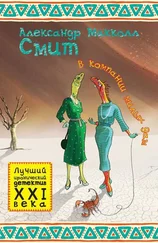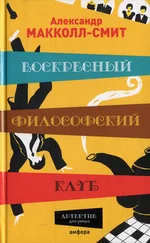‘That’s very good,’ said Mma Makutsi. ‘It wouldn’t seem right to pay for a conversation about tags and keys and so on. Nor for a quick walk about a building – or subjects, shall I say?’ She paused. ‘Not after I have paid so much for the drawing up of a lease.’
He was quick to agree. ‘Of course not, Mma.’
The building’s last use had been as a shop, and when they entered they saw that the previous tenant had left not only the shop fittings but some of the stock as well. The premises had been used by a firm of outfitters for both men and women, and in some of the display cases there was still the occasional blouse or belt. Most of the drawers had been cleared out, but in one there was a tangle of garish ties and three odd socks.
‘The tenant should have removed all this rubbish,’ said Mr Disang disapprovingly. ‘People!’
Mma Makutsi agreed. ‘Yes,’ she said. ‘There are some people who are very sloppy. They just don’t care, do they, Rra?’
‘They do not,’ said Mr Disang vehemently. ‘They are useless rubbish, these untidy people. They go about the country making it untidy and expecting other people to clear up behind them.’
In spite of her earlier disapproval, Mma Makutsi found herself warming to Karabo Disang. She had strong views on litter and general sloppiness, and she was pleased to discover that these were shared. Some people, she knew, were unbothered by these matters and merely shrugged their shoulders. These were people for whom it was presumably not an affront that there should be discarded beer bottles and plastic bags lying about on the edge of the road, blown by the wind into small piles, caught on the wire of cattle fences. Well, if they had their way the country would soon be covered with rubbish; so much so, she imagined, that it would disappear altogether. People would say, ‘There used to be a Botswana somewhere around here, but we just can’t find it now – it seems to have disappeared.’ Hah! That would teach those who were unexercised about litter. There should be an anti-litter political party, she decided. It would campaign on a no-litter platform, with a promise that anybody who threw things down on the ground would be forced to spend their weekend clearing up. That would soon stop that. But the party would have to print leaflets to explain its policies to the voters, and everybody knew what one did with political leaflets – one threw them away, and that —
Her train of thought was interrupted by Mr Disang clearing his throat.
‘You are hoping to make this place into a restaurant, Mma,’ he said. He spoke tentatively – respectfully – as he realised that Mma Makutsi was no ordinary client. One could condescend to ordinary clients, but there was a certain sort of lady to whom one did not condescend, and this was one of them.
‘That is my plan, Rra,’ said Mma Makutsi rather absently, looking up at the ceiling now. The lights were still there but would have to be replaced, she felt, by something more in keeping with the ambience she had in mind for her restaurant.
‘That is very good,’ said Mr Disang. ‘I am sure that it will be a very popular restaurant.’ He paused. ‘Of course, if one is running a restaurant one needs somebody to cook. That is very important.’
Mma Makutsi glanced at him. ‘Obviously, Rra,’ she said. ‘If there is nobody to cook, then there will be no food. I don’t think there’s much point in having a restaurant with nothing on the menu.’
Mr Disang laughed. ‘It would be very easy to choose, though. I always find it difficult to make up my mind when I go to a restaurant and I see a whole page of choices. How can you decide in such circumstances? Imagine if you’re sitting down for your breakfast and your wife gives you a long list of things you can eat. Imagine that, Mma. What would you do?’
‘Or it could be the wife sitting down and the husband giving her the menu,’ snapped Mma Makutsi. ‘I believe there are some husbands who cook for their wives. I have heard of these people…’ She left the remark unfinished, demonstrating through the look she gave Mr Disang that she certainly did not think he fell into this category.
Mr Disang laughed again, but more nervously now. ‘Of course, Mma, of course.’ He hesitated. ‘But, as I was saying, you will need a cook, I think.’
‘They call them chefs,’ said Mma Makutsi. ‘A cook is any old cook; a chef is much more special.’
‘That is very true,’ said Mr Disang. ‘They are very talented people, these chefs.’
Mma Makutsi started to cross to the other side of the room. Mr Disang followed her.
‘I was thinking that I might be able to help you,’ he said. ‘If you are going to look for a chef, then I think I know one who might be interested in the job. He is a famous chef, I think. He is very good.’
Mma Makutsi looked at her lawyer. She noticed that there were small beads of perspiration on his brow. He must be one of those people who sweat easily, she thought. ‘Who is this chef?’ she asked.
‘I know him quite well,’ said Mr Disang. ‘He is a person I see from time to time. He is probably the best chef in Botswana – or so I’ve heard people say.’
Mma Makutsi raised an eyebrow. ‘But if he is such a famous chef, then why would he want to come and work for me?’ she asked. In business matters she tended to optimism, but she was realistic, too. ‘If you’re a famous chef, then surely you’re very busy cooking at those big hotels. The Sun. The Grand Palm. They are the places where all the famous chefs go.’
Mr Disang seemed unworried by the objection. ‘There are chefs who have done all that,’ he said dismissively. ‘They have worked in all those big places and then they think: I need a new challenge. That is what they think, Mma.’
Mma Makutsi stared at him appraisingly. He noticed, and his confidence seemed to grow visibly. ‘I can arrange for you to see him, Mma,’ he pressed. ‘Think about it: you’ll have no need to worry about finding a chef for your new restaurant. All that will be fixed up.’
She hesitated, and sensing her hesitation, he continued: ‘You know it makes sense, Mma.’
She gazed out of the window into the yard outside. The previous occupants had left that in a messy state too: there were old barrels, an untidy pile of firewood, the chassis of an ancient car like a skeleton long since stripped of its clothing of flesh. There was much to do: tidying the place up; and then there would be the decoration; and the fitting out of the kitchen. If a chef were to be identified at this stage, then that at least would be one thing less on the list of things to be done.
‘You can bring him to see me, Rra?’ she asked.
Mr Disang nodded. ‘There will be no problem with that. Today, tomorrow – whenever you want to see him, I will bring him for an interview. You will be very pleased with him.’
‘What is his name, Rra?’
She noticed that Mr Disang looked away.
‘Well, Rra: what is he called?’
Mr Disang cleared his throat. ‘He is called Thomas.’
‘Thomas what, Rra?’
This was greeted by a long silence. Then Mma Makutsi said, ‘Thomas what, Rra? People are not just called Thomas – unless they are in the Bible.’
Mr Disang laughed nervously. ‘Oh, that is very funny, Mma. People in the Bible have only one name – that is quite true. They are not called Makutsi or Ramotswe…’
‘Or Disang,’ supplied Mma Makutsi.
‘No,’ said Mr Disang. ‘There are no Disangs in the Bible.’
‘Well?’ asked Mma Makutsi. ‘What is his family name, Rra? Thomas what?’
Mr Disang fingered his tie. ‘I am not quite sure, Mma. I don’t think he uses one.’ He suddenly brightened, as if an idea had occurred to him. ‘No, that’s right. He’s one of these people who don’t really use a family name any more. I believe they feel that it’s old-fashioned.’
Читать дальше







![Александр Макколл Смит - Отдел деликатных расследований [litres]](/books/397661/aleksandr-makkoll-smit-otdel-delikatnyh-rassledova-thumb.webp)




